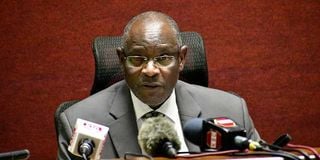
High Court Judge Chacha Mwita at the Milimani Law Court on January 26, 2024.
At least 234,811 students admitted to universities in 2023 and 2024 now face an uncertain future after the High Court struck down President William Ruto's new funding model.
This comes as the government considered options such as funding only 30 per cent of students, raising the cut-off grade for university entry and restricting the number of students it funds altogether - all bitter pills for already stretched students.
High Court Judge Chacha Mwita struck down the new funding model on Friday, saying it was unconstitutional and discriminatory. The judge said it had been implemented without adequate public participation, despite its significant impact on higher education.
Now, Kenya Universities and Colleges Central Placement Service (KUCCPS) Chief Executive Officer Agnes Wahome has warned of huge repercussions for students and institutions, describing the situation as "really unfortunate".
Dr Wahome said KUCCPS would continue to place all students with C+ and above in public universities under the old funding model, also known as the Differentiated Unit Cost (DUC) model.
The new funding model, which was introduced to replace the DUC system, was designed to provide a mix of government scholarships and loans based on students' financial needs. It aimed to address equity in higher education funding and reduce the financial burden on families.
However, due to financial constraints, Dr Wahome said the government could only fund each student at less than 30 per cent of the recommended allocation.
She warned that this funding gap was pushing universities further into debt and jeopardising the quality of education.
"The honourable court needs to know that the government has never and will never be able to afford the reinstated 80 per cent DUC," the CEO said.
"KUCCPS continues to place all C+ and above, who then share the available budget as DUC. This means that a student will be funded at less than 30 per cent."
She also spoke of a possible policy shift that could see the government raise the cut-off grade for university admission in order to limit the number of students receiving state funding.
Such a move could force students, especially those with C+ and B- grades, to pursue self-sponsored programmes.
"Children from poor families, especially from day schools, will not be able to afford a university education," said Dr Wahome.
The decision has now caused fresh chaos, with students Sunday Nation spoke to revealing the harshness of life on campus under the new model and the uncertainty of their future.
"We haven't been given clear guidance. I was initially placed in band 5 (for high income earners who get the least support from the government to pay fees), but I appealed in the hope of being moved to band 2 or 3 (who get more support from the government to pay fees). Now the exams are scheduled for January and we're expected to pay our fees to sit them. The new funding model has been stopped and we don't know how much we will have to pay, which is more worrying," said Mary Wangare, a first-year student at Multimedia University.
Leonella Nagoya, an Eco-Tourism, Hotel and Institutional Management student at Maseno University, who had been placed in Band 5, had to pay Sh73,000 per semester - an amount far beyond her family's means. .
"To be honest, I don't know how to feel. Yes, they overturned it - I had appealed and we were waiting. So what now? My mother is the breadwinner and she struggles to feed us. Where will the fees come from?" she asked.
Simon Khaemba, a student at the Jomo Kenyatta University of Agriculture and Technology, said students should be refunded the high amounts they paid under the old model.
As universities prepare to close for the year, the pressure is mounting.
Uncertainty about whether she will sit her exams in January is consuming her thoughts.
"The big question is whether the government will be able to comply with the court orders. We have a history of a government that has always defied court orders. Now that it has been quashed, what will happen to those of us who have paid these expensive amounts as school fees, will there be a refund? At least the court has given them time and we urge them to revert to the old funding model where things worked," said Mr Khaemba.
The model was introduced by President William Ruto in May 2023. It categorises students into five bands, with those from vulnerable and extremely needy households eligible for full funding, while less needy students could receive up to 90 per cent funding.
Kenya Universities Staff Union (KUSU) president Charles Mukhwaya argued that education, as a fundamental right, requires a funding framework that reflects inclusivity and fairness.
The model, he says, has been criticised for favouring wealthier families, potentially limiting access to higher education for many Kenyan youth.
"When the court nullified the new funding model, it was partly because there was no public participation. Kenyans should have been involved in this process because education is a fundamental right for all. For a developing country like ours, high levels of literacy are crucial for growth, and this model did not resonate with many from the start," the unionist said.
"The way the funding model was designed seemed to favour those from wealthier backgrounds, which could deny many Kenyan youth access to higher education. Public participation could have addressed these issues, smoothed out the rough edges and ensured that the model truly serves the needs of Kenyans," he added.
Mr Mukhwaya suggested a return to the old funding model, with improvements such as restructuring HELB and consolidating various scholarship funds into a single education fund to reduce inefficiencies and corruption.
"The government must ensure that public universities are not run like private institutions. They are public assets and the exchequer must provide adequate resources for their proper functioning. We can survive without the new funding model if we address existing inefficiencies and focus on equitable access," said Mukhwaya.
Prof Daniel Mugendi, chairperson of the vice-chancellors' committee, told the Sunday Nation that they were yet to reach a consensus and were awaiting legal interpretation of the ruling to understand its implications.
"We have not made any decisions. We need to understand the ruling first," said Prof Mugendi, who is the vice-chancellor of Embu University.
President William Ruto has been at the forefront of defending the university funding model, despite a court blocking its implementation, as the committee he appointed struggles to come up with a workable solution eight weeks into its review.
In September, he appointed a 129-member committee to review the new funding model for higher education.
"This model prioritises the most vulnerable students, offering them up to 95 per cent government support while bringing our universities back from the brink of collapse," President Ruto said in his State of the Nation address.
Additional reporting by Ndubi Moturi











